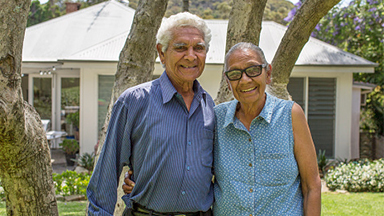If you’re looking to maximise your superannuation, it’s a good idea to be up to speed on any legal updates that could affect the super and tax landscape.
With super caps going up and tax cuts coming in, there are some big changes on 1 July 2024 that could help you boost your retirement savings.
Here’s how it’s all going to work.

Super caps are going up...
There are annual caps – or limits – on how much money you can contribute towards super, both in terms of pre-tax ‘concessional’ contributions and after-tax ‘non-concessional’ contributions.
Both these caps are going up, so if you have any spare funds you’ll be able to move more of your money into super’s low-tax environment.
- The concessional cap is increasing from $27,500 to $30,000 a year.
- The non-concessional cap is increasing from $110,000 to $120,000 a year.
Time to tweak your salary sacrifice plan
For PAYG employees, the compulsory SG will go up by half of a percent to 11.5% from 1 July. While the annual concessional contribution cap will increase to $30,000, allowing more salary to be sacrificed into super, the increase in SG rate will reduce some of that additional capacity to salary sacrifice. So it is good time to review your existing salary sacrifice arrangement with your employer.
How to play catch up with your super
There are special rules that allow you to pay even more into your super – useful if you’re playing catch-up before retirement.
With concessional contributions if you have less than $500,000 in your super on 30 June of the previous financial year, you can carry forward unused amounts from up to five previous years. So if you didn’t contribute the full amount in 2018-19, this is your last chance to use any unused amounts from that financial year – the opportunity will expire on 30 June 2024.
How to make large contributions to your super
With non-concessional contributions if you have less than $1.66m in your super on 30 June 2024, you can bring forward three years of contributions up to $360,000. The higher annual cap means the total amount you can tip into super using the bring-forward rule has increased from $330,000 to $360,000.
The rules can be a bit complex so if you come into a windfall from selling an asset or receiving an inheritance, it’s worth chatting to a financial adviser about the best way to increase your retirement savings.
...and tax cuts are coming in
The Government’s long-awaited ‘stage 3’ tax cuts are coming into effect on 1 July 2024. While there have been well-publicised changes – lower income earners will receive a higher cut than originally proposed, while higher income earners will receive a lower cut – the bottom line is that all personal income taxpayers will pay less tax.
Your tax cut from 1 July 2024
| Taxable income |
Tax payable 2023/24 | Tax payable 2024/25 | Tax cut |
| $40,000 | $4,367 | $3,713 | $654 |
| $60,000 | $11,067 | $9,888 | $1,179 |
| $80,000 | $18,067 | $16,388 | $1,679 |
| $100,000 | $24,967 | $22,788 | $2,179 |
| $120,000 | $31,867 | $29,188 | $2,679 |
$140,000 |
$39,667 | $35,938 | $3,729 |
| $150,000 | $43,567 | $39,838 | $3,729 |
| $160,000 | $47,467 | $43,738 | $3,729 |
| $180,000 | $55,267 | $51,538 | $3,729 |
| $190,000 | $59,967 | $55,438 | $4,529 |
| $200,000 | $64,667 | $60,138 | $4,529 |
Source: https://treasury.gov.au/tax-cuts/calculator
So before 1 July 2024 when you’re still paying a higher rate of tax, you might like to think about bringing forward any tax deductions by:
- making personal deductible contributions to your super using any unused amounts from 2018/19
- prepaying any deductible expenses such as income protection premiums and investment loan interest where possible.
And then after 1 July 2024 you’ll be paying a lower rate of tax. So you might like to think about deferring any income from:
- selling an asset that generates a capital gain
- receiving an employment termination payment or leave entitlement
- applying for a First Home Super Saver Scheme release
- making a taxable super withdrawal, such as total and permanent disability under age 60.
The good news is that if you’re a taxpayer you’ll have more disposable income that will help soften some of the cost-of-living pressures we’re facing.
If you’re lucky enough to have some spare funds, you might like to talk to a financial adviser about ways to utilise the additional disposable income, which may include paying down non-deductible debt and/or boost your super in terms of salary sacrificingbefore tax or after-tax contributions.
If you'd like to understand your super better, book in a chat with a super coach at no extra cost.
Speak to a super coach

Tax-deductible super contributions explained
01 July 2024 | Super Did you know you can claim a tax deduction on certain super contributions when you do your tax return? Read more
Salary sacrificing into super – how it works
01 July 2024 | Super Salary sacrificing into super involves reducing your take-home pay to put more money away for your retirement. See what you need to know. Read more
Super contribution rules when you’re in your 60s and 70s
01 July 2024 | Super Know your options around making contributions, accessing your super savings and when Age Pension entitlements could be affected. Read moreWhat you need to know
Any advice and information is provided by AWM Services Pty Ltd ABN 15 139 353 496, AFSL No. 366121 (AWM Services) and is general in nature. It hasn’t taken your financial or personal circumstances into account.
It’s important to consider your particular circumstances and read the relevant product disclosure statement, Target Market Determination or terms and conditions, available from AMP at amp.com.au, or by calling 131 267, before deciding what’s right for you.
You can read our Financial Services Guide online for information about our services, including the fees and other benefits that AMP companies and their representatives may receive in relation to products and services provided to you. You can also ask us for a hardcopy.
All information on this website is subject to change without notice. AWM Services is part of the AMP group.